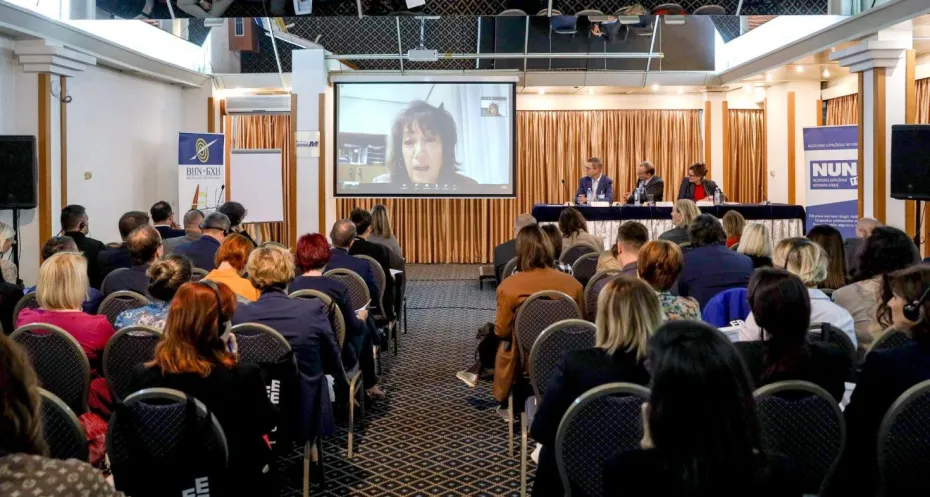Between the media and the judiciary: safety of journalists in the Western Balkans

For more than two decades, Free Press Unlimited has been implementing projects in the Western Balkans. Now, when the world is witnessing a steep decline in press freedom and access to information, the spread of misinformation and growing anti-press sentiments, the efforts of Free Press Unlimited to safeguard press freedom and promote access to reliable and independent information in the region are especially important. As a result, in the framework of the project “Strengthening Media Freedom in Bosnia and Herzegovina, North Macedonia and Serbia”*, Free Press Unlimited and the Netherlands Helsinki Committee decided to organise a conference on the topic of “Judicial Communication and Journalists’ Safety”.
Understanding the role of different stakeholders
To encourage the start of the dialogue, judges, public prosecutors, journalists and journalists' associations and unions from the region were invited to Belgrade to participate in the two-day conference filled with plenary sessions and workshops tailored to the particular interests of each of the groups. The primary purpose of the conference was to facilitate conversations amongst different stakeholders. The intention was for these exchanges to provide participants with an increased understanding of one another’s crucial role in a democratic society. Around 100 people participated in the event.
Overview: Day 1
The first day started with a panel hosted by Andrej Bozhinovski, Doctoral Assistant in Criminal Law, University of Zagreb, who presented the Macedonian model of cooperation between the media and the judiciary, and explained what role the Judicial Media Council plays in mediating and maintaining this relationship.
Following this, University of Belgrade professors Denis Preshova and Tanasija Marinković presented their research findings on “The Judicial Culture”, concluding that the judicial culture in the region is still predominantly formalist, with the judiciary struggling to act independently, demonstrating a high level of legislative deferral and political obedience.
The next plenary session focused on a research that investigated how journalists in the Western Balkans perceive the work of the judiciary. The comparative study conducted by Snežana Trpevska, researcher from the Research Institute on Social Development - RESIS, established that there is still a lot of room for improvement in building trusted relationships between the media and the judiciary. Journalists interviewed for the research noted that the relationship between the two institutions are still dominated by secrecy and fear, the information and documents from courts are difficult to access while judges and court presidents are rarely available to journalists for additional comments.
The second part of the day was devoted to the topic of the safety of journalists with Dragan Sekulovski, executive director of the Association of Journalists of Macedonia, talking about the state of journalist safety in the Western Balkans and establishing that the impunity for crimes against journalists is one of the main problems alongside with the poor implementation of the laws and institutional pressure on journalists.
Sekulovski’s presentation was followed by Peter ter Velde telling about the Dutch example of handling harassment and intimidation cases against journalists. He presented a project called PersVeilig (Press Safety) that implemented special protocols in the Netherlands on how journalists, police and members of the judiciary should act in case of incidents and crimes against journalists.
Overview of Day 2
On the second day of the conference, two separate workshops for the media and the judiciary were held. The judges and public prosecutors learned useful tools on how to establish effective communication with journalists while the journalists and editors further delved into the topic of safety and discussed the importance of safety culture in the editorial offices and common misconceptions about safety.
For future events, the majority of participants expressed the desire to focus more attention on steps and tools for organising press conferences in courts, ways of dealing with nepotism and corruption, and the use of online judging systems and social media during court hearings.
The regional conference was a great success and will be organised again next year. conferences like these are very important in achieving and enhancing media freedom and freedom of expression in the Western Balkans. Not only do they give journalists from the region the platform to voice their opinions and tell about challenges they face in the pursuit of timely and complete information from the courts but they also provide the judiciary with more context and understanding of the importance of effective communication with the media.
The project started in October 2020 making it impossible to hold in-person meetings earlier due to COVID. This regional conference was long anticipated as it intended to give a platform for the media and the judiciary to meet, exchange views and as the result develop a more open and trusted relationship, which was crucial in achieving the main objectives of the project.
*The initiative was funded by the MATRA Rule of Law programme of the Dutch Ministry of Foreign Affairs and implemented by two organisations in cooperation with regional partners: BH Journalist Association, the Association of Journalists Macedonia and the Independent Journalists’ Association of Serbia.
